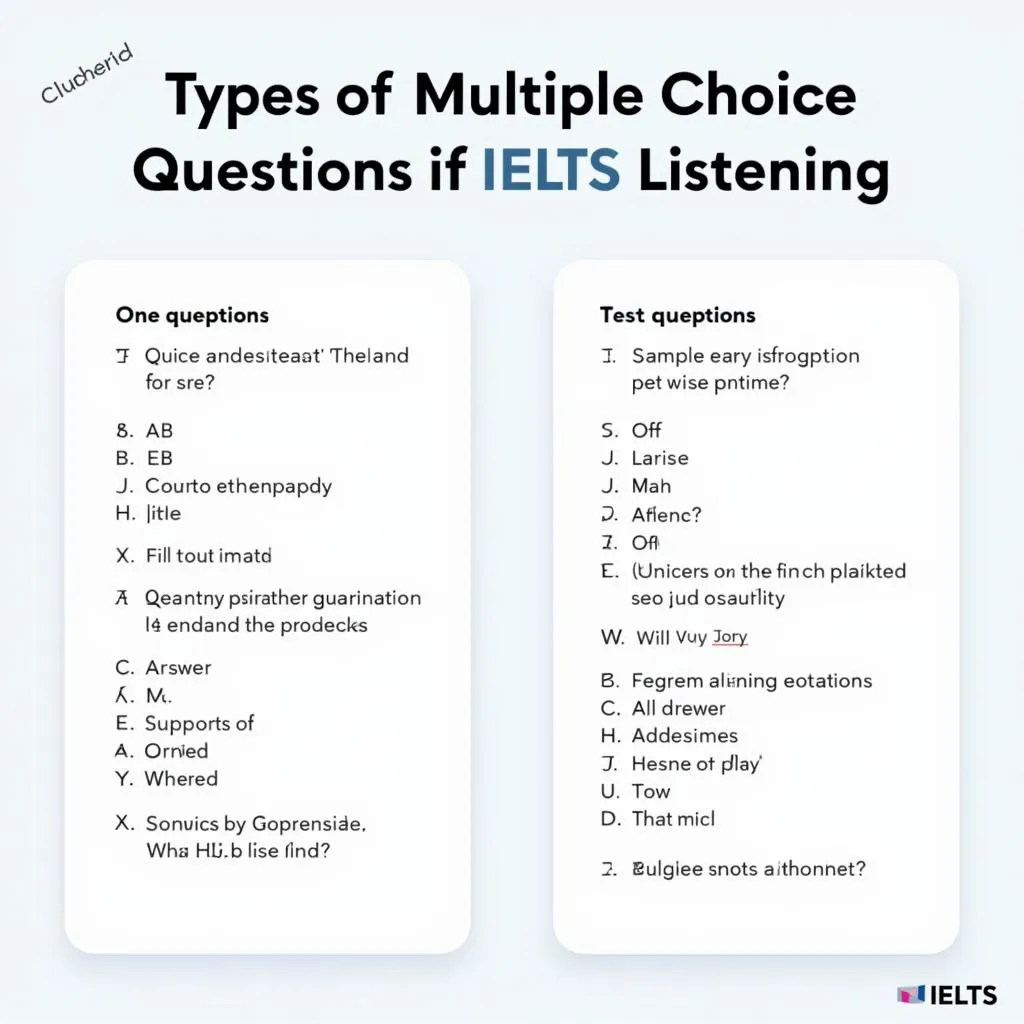Understanding Multiple Choice Questions in IELTS Listening
Multiple choice questions (MCQs) are a common question type in the IELTS Listening test. These questions require candidates to select the correct answer from a list of options. Mastering MCQs is crucial for achieving a high score in the Listening module, as they appear in various sections of the test and can significantly impact your overall performance.
Types of Multiple Choice Questions
There are two main types of MCQs you’ll encounter in IELTS Listening:
- Questions with three options (A, B, C)
- Questions with four options (A, B, C, D)
Both types require careful listening and strategic approach to select the correct answer efficiently.

Essential Tips for Tackling Multiple Choice Questions
1. Read the Questions and Options Beforehand
One of the most crucial IELTS Listening tips for multiple choice questions is to read the questions and options carefully before the audio begins. This strategy allows you to:
- Understand what information you need to listen for
- Identify key words and phrases in the questions and options
- Predict possible answers based on the context
By familiarizing yourself with the questions, you’ll be better prepared to catch the relevant information when it’s presented in the audio.
2. Focus on Key Words
When listening, pay close attention to key words that match or relate to the options provided. These may include:
- Nouns (names, places, objects)
- Numbers (dates, times, quantities)
- Adjectives (descriptive words)
- Verbs (action words)
Identifying these key words will help you narrow down the correct answer more quickly and accurately.
3. Beware of Distractors
IELTS Listening MCQs often include distractors – incorrect options that sound plausible. To avoid falling for these traps:
- Listen for specific details that differentiate between similar-sounding options
- Pay attention to qualifiers (e.g., “always,” “never,” “sometimes”)
- Be cautious of options that use exact words from the audio but in a different context
4. Use the Process of Elimination
If you’re unsure about the correct answer, try eliminating options that are clearly incorrect. This technique can increase your chances of selecting the right answer, even if you’re not 100% certain.
5. Don’t Leave Any Questions Unanswered
In IELTS Listening, there’s no penalty for incorrect answers. Therefore, it’s essential to answer all questions, even if you’re unsure. If you’re running out of time, make an educated guess based on the information you’ve gathered.
Advanced Strategies for IELTS Listening MCQs
1. Practice Active Listening
Develop your active listening skills by:
- Focusing intently on the audio without getting distracted
- Mentally summarizing key points as you listen
- Anticipating what might come next based on the context
These skills will help you process information more effectively during the test.
2. Improve Your Note-Taking Technique
Efficient note-taking can be a game-changer for IELTS Listening MCQs. Try these tips:
- Use abbreviations and symbols to save time
- Write down key words and phrases, not full sentences
- Organize your notes in a way that matches the question order
Remember, your notes are just a tool to help you answer the questions, not a transcript of the audio.
3. Familiarize Yourself with Various Accents
IELTS Listening tests feature speakers with different English accents, including British, American, Australian, and others. To prepare:
- Listen to a variety of English-language podcasts, news broadcasts, and interviews
- Pay attention to pronunciation differences and regional expressions
- Practice with IELTS sample tests that include diverse accents
4. Manage Your Time Effectively
Time management is crucial in IELTS Listening. For MCQs:
- Allocate your time wisely between reading questions and listening
- If you miss an answer, move on to the next question quickly
- Use any gaps between sections to review your answers and prepare for the next set of questions
5. Stay Calm and Focused
Maintaining composure during the test is essential. If you feel anxious:
- Take deep breaths to stay relaxed
- Remind yourself that you’ve prepared well
- Focus on one question at a time, rather than worrying about the entire test
Common Pitfalls to Avoid
When tackling IELTS Listening multiple choice questions, be wary of these common mistakes:
- Choosing an answer based solely on familiar words heard in the audio
- Ignoring context and selecting an option that doesn’t fit the overall message
- Changing answers without a good reason, especially if your first instinct was correct
- Spending too much time on one difficult question and missing subsequent answers
- Failing to check your answers in the time provided at the end of each section
Next Steps: Practice and Improvement
To enhance your performance on IELTS Listening multiple choice questions:
- Take regular practice tests under timed conditions
- Analyze your mistakes and identify patterns in your errors
- Focus on improving your overall listening skills through daily English exposure
- Work on expanding your vocabulary, especially in common IELTS topics
- Seek feedback from IELTS tutors or study groups to refine your approach
By implementing these IELTS Listening tips for multiple choice questions and consistently practicing, you’ll be well-equipped to tackle this question type with confidence on test day. Remember, success in IELTS Listening comes from a combination of strategic approach, focused practice, and strong English language skills.